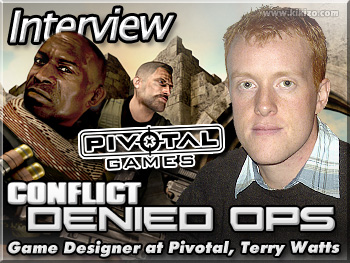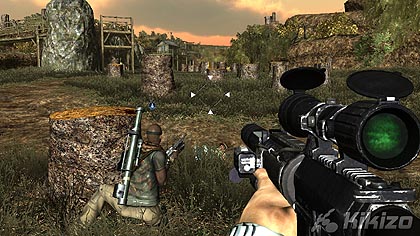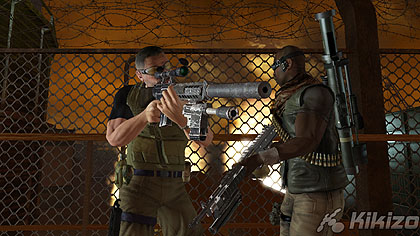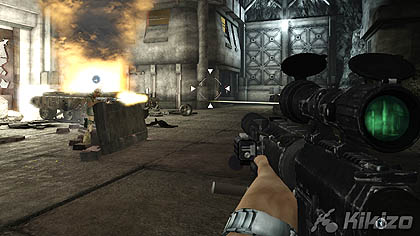Conflict: Denied Ops - Pivotal Interview
Is the Conflict series about to go AAA? Terry Watts denies all knowledge of certain things (like SCi turbulence affecting development), while opening up on others (like the new Conflict: Denied Ops game).
Page: 1 2
By Adam Doree
The Conflict series has always enjoyed moderate critical acclaim and success since its inception in 2002, with a quick skim through GameRankings revealing sixty to high seventies in percentage terms throughout the first four games. Now, with a new FPS perspective, next-gen technology and the comfortably recognisable Eidos logo on the box, is Conflict: Denied Ops going to boost the series into AAA territory?

A lot of people are certainly hoping so, not least of all Terry Watts, Game Designer at the developer, Pivotal Games. And a bunch of Eidos staff. And the SCi board. But the good news is that Denied Ops looks promising, and like any new FPS wortha look these days, actually offers a few new features to distinguish it from the pack. We sat down with Terry to cut thorough the issues and let him tell you what's going to make Denied Ops a bigger deal than previous games in the Conflict series.
![]()
Kikizo: Terry, thanks for your time to talk about Conflict Denied Ops. So firstly, how long have you been at Pivotal?
Terry Watts: I've been at Pivotal for just over three years. I basically came in at the end of Conflict: Global Terror, when that was at the end of its development, and I started straight away on Denied Ops.
Kikizo: Can you tell us about changes and developments you've noticed at Pivotal as a developer during your time there?
Watts: Sure, yes, Pivotal over the last three years has grown quite considerably. I think when it did originally form, it only had maybe ten or twenty people working there. Now we're a studio of over 110 people. The main change as a studio that you have to deal with is the relaying of information to people. Whereas in a team of twenty people that's pretty easy, when you've got 110 people, you have to relay information in a better way, so that means a lot more presentations to groups of people, and just generally a lot more effort and care is taken when you do documents, to provide as much material etcetera, so that everybody reading it can get everything out of it, because you're not going to be able to talk to everybody face-to-face.
Kikizo: You must have been following the latest news with Eidos and SCi, what do you make of it all, does it affect you as a development team?
Watts: It's not something we really concern ourselves with - and it's not really our place to talk about it. It's stuff that's happening at Eidos, and that's really where it stays.
Kikizo: The first Conflict game was around 2002, right?
Watts: Yeah, it was literally when the PS2 was first out, the first Conflict - Desert Storm - came out then and did very well, and kind of set the standard for what the Conflict brand was going to be about.
Kikizo: What would you say distinguishes this series and how has it changed over the four or five games up to this point?
Watts: Yes, this is the fifth game in the series. The first four were fairly similar in terms of gameplay; they all had four characters and they all used the same four characters, apart from Vietnam. They were all set in real-world locations, and two or three were real-world conflicts as well. But with Eidos we've changed the focus of the Conflict brand slightly, in order to open it up to a wider market and attract new people.
Kikizo: Perhaps an obvious question, but with the absolute deluge of first-person shooters these days, did that not make you think twice about changing this into an FPS?
Watts: Obviously, that was a consideration. I mean, we looked at that, but one of the goals we set out was to attract new people to the genre, so one of the obvious ways to do that is to change the perspective of the camera. So we changed it, and we're aware there are a lot of first-person games out there, but we've got something quite unique in this squad system and the ability to change between two characters, to differentiate us from the rest of the competition.
Kikizo: Army of Two is also coming out, although that is controlled by two different players and also not first-person, so is this the first FPS where you can switch between two players as you feel like it?
Watts: As far as I'm aware, it is. I think it's the only game where you can switch between two characters on the fly, at any point, and also issue orders to the other character. So that's one thing we're quite product about for Denied Ops, and what we think differentiates us from the rest of the market.
Kikizo: It certainly seems to add something. I mean in COD4 we had different level with deliberately different gameplay themes, and its variety came from there. Here you decide how you mix gameplay up within one level. What other dynamics does character switching create?
Watts: It allows us to open levels up a bit more, so we've got multiple routes through each of the levels, allowing you to split your characters up and flank enemy positions. And the ability to switch between the characters means you've got a lot more control about where each character is, and when they do stuff. You know, often in a lot of games the order system dictates how well you control that other character; you literally have to see that other character's position. Whereas in ours, you can just switch to that character and run him there - so he may be behind another building or inside a huge building while you're outside; you can switch to that guy and move him through the building freely, without having to do it via an order system. So you've got a lot more control, about when and where you do stuff.
Page: 1 2












 Satoru Iwata Video Interview - the late Nintendo president spoke with Kikizo in 2004 as 'Nintendo Revolution' loomed.
Satoru Iwata Video Interview - the late Nintendo president spoke with Kikizo in 2004 as 'Nintendo Revolution' loomed. Kaz Hirai Video Interview - the first of Kikizo's interviews with the man who went on to become global head of Sony.
Kaz Hirai Video Interview - the first of Kikizo's interviews with the man who went on to become global head of Sony. Ed Fries Video Interview - one of Xbox's founders discusses an epic journey from Excel to Xbox.
Ed Fries Video Interview - one of Xbox's founders discusses an epic journey from Excel to Xbox. Yu Suzuki, the Kikizo Interview - we spend time with one of gaming's most revered creators.
Yu Suzuki, the Kikizo Interview - we spend time with one of gaming's most revered creators. Tetris - The Making of an Icon: Alexey Pajitnov and Henk Rogers reveal the fascinating story behind Tetris
Tetris - The Making of an Icon: Alexey Pajitnov and Henk Rogers reveal the fascinating story behind Tetris Rare founders, Chris and Tim Stamper - their only interview? Genuinely 'rare' sit down with founders of the legendary studio.
Rare founders, Chris and Tim Stamper - their only interview? Genuinely 'rare' sit down with founders of the legendary studio. The History of First-Person Shooters - a retrospective, from Maze War to Modern Warfare
The History of First-Person Shooters - a retrospective, from Maze War to Modern Warfare